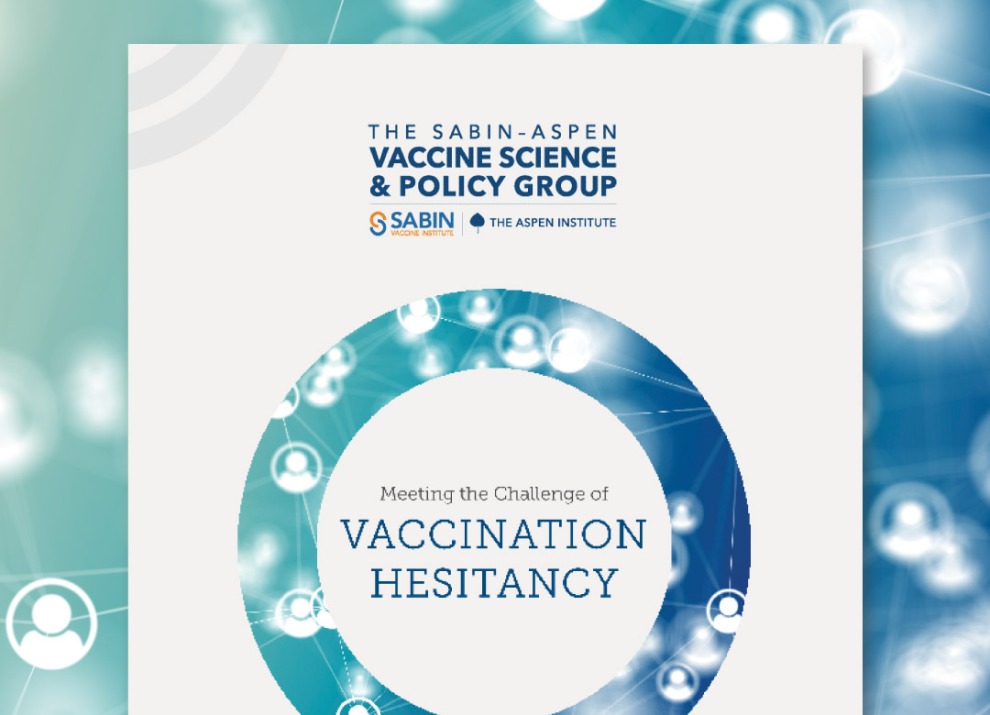Meeting the Challenge of Vaccination Hesitancy

The end of the COVID-19 pandemic will depend on our ability to address vaccine hesitancy, one of the top 10 threats to global health, before a vaccine is put on the market. Meeting the Challenge of Vaccination Hesitancy, a report published in June 2020 by the Sabin-Aspen Vaccine Science & Policy Group, lays out actionable steps that leaders across healthcare, research, philanthropy and technology can take to build confidence in vaccines and vaccinations.
Even before the COVID-19 pandemic, worldwide measles outbreaks in communities with low immunization rates revealed gaps in the herd immunity that once protected us, including the United States’ largest measles outbreak in 20 years in 2019. The troubling trend of declining vaccination uptake is fueled by complacency and loss of confidence in the system that develops, produces, recommends and delivers vaccines.
In addition to the report, “How to counter vaccine skepticism if a coronavirus vaccine becomes available,” is an op-ed published on June 9, 2020, in Fortune Magazine by the co-chairs of the Sabin-Aspen Vaccine Science & Policy Group, Dr. Shirley M. Tilghman, president emerita and professor of molecular biology and public affairs at Princeton University; and Dr. Harvey V. Fineberg, president of the Gordon and Betty Moore Foundation. The piece urges energy and focus on addressing vaccination hesitancy.
Bold, interdisciplinary, global action is urgently needed to ensure confidence in immunization, which is estimated to save between 2 and 3 million lives every year. Three ‘Big Ideas’ proposed in the report address the primary barriers to vaccine acceptance, provide a framework for progress, and sound a call to action. They are:
- A new media collaborative to serve as an interface between the vaccination community and social media platforms
- A research agenda to create ample evidence-based knowledge about the sources of vaccine hesitancy and the best ways to counter it
- A new narrative to shift the conversation around immunization to one that focuses on achievements and promise and helps build resiliency in the vaccine enterprise
This report from the 2019 meeting of the Sabin-Aspen Vaccine Science & Policy Group highlights that although vaccination remains a well-accepted social norm worldwide, a combination of factors—including the spread of misinformation on social media; decreased trust in institutions including government, science and industry; and weaknesses within health systems—has diminished confidence among some populations.
Framing the key findings of the report are five original background papers detailing current challenges and opportunities to approach vaccination hesitancy across various disciplines, including social media and online misinformation, social and behavioral science insights and research into the genesis of social movements.
About the Sabin Aspen Vaccine Science & Policy Group
The Sabin-Aspen Vaccine Science & Policy Group, a partnership launched in 2018 between the Sabin Vaccine Institute and the Aspen Institute, brings together senior leaders across many disciplines to examine some of the most challenging vaccine-related issues and drive impactful change. Members are influential, creative, out-of-the-box thinkers who vigorously probe a single topic each year and develop actionable recommendations to advance innovative ideas for the development, distribution and use of vaccines, as well as evidence-based and cost-effective approaches to immunization.







